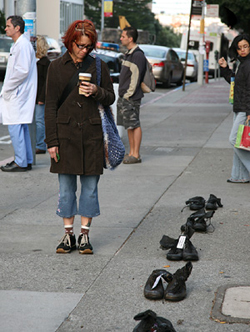By
Shipra Shukla
Saunders Court and part of the sidewalk along Parnasssus Avenue were transformed last Wednesday by a national exhibit brought to campus by the UCSF Iraq Action Group.
The Iraq Action Group is an alliance of students, faculty and staff united to educate each other, the campus community and the public about the health effects of the Iraq war on American and Iraqi citizens and soldiers. In May, the group hosted a well attended teach-in at UCSF.
Arriving at UCSF just a few days before the Sept. 21 nationwide Iraq Moratorium, organizers hoped the display would allow for quiet reflection about the Iraq war. However, a few passersby did verbally protest the display while UCSF police looked on.
 |
A passerby stops to observe the row of boots along Parnassus Avenue. |
"This is one of a number of events taking place on our campus this fall meant to keep our community in touch with the reality on the ground in Iraq," said Dan Lowenstein, MD, professor of neurology and a member of the Iraq Action Group. "We hope that everyone who was able to pay tribute to those who are represented by the boots can take action based on the voice of their conscience."
The exhibit is sponsored by the American Friends Service Committee (AFSC). Founded by Quakers in 1917, AFSC's states its mission as "carrying out service, development, social justice and peace programs throughout the world." The exhibit began touring the country in 2003.
Many of the boots carried a tag with the name of the solider who once worn them. The shoes belonging to fallen civilians carried no tag and provided an eerie contrast against the sea of black boots.
 |
The boots of Omead Razani, a US Army medic who died in the Iraq war, was among the 400 pairs displayed at the exhibit at UCSF last Wednesday.
|
Nooshin Razani, MD, MPH, a UCSF fellow at the Center for AIDS Prevention Studies and member of the UCSF Iraq Action Group, lost her 19-year-old brother Omead Razani while he was serving as a medic for the US Army in Habbaniyah, Iraq. The organizers of the exhibit, AFSC, asked her to speak when it came to San Francisco's Civic Center two years ago. After she saw the exhibit, she decided it needed to come to UCSF.
"I was so moved that people could come and see the boots," she said. "When you're a family member, you get the soldier's boots. That's all you have left of them. I wanted to bring the exhibit here to UCSF. I think it's especially poignant that it's here. This is a health sciences campus and all day long we talk about how to keep people healthy, and here are [the shoes of ] previously healthy people who died from a preventable cause."
Razani, along with many volunteers from the UCSF Iraq Action Group, AFSC, Military Families Speak Out and the neighborhood church St. John of God spent most of Wednesday bearing the blustering wind to talk about and hand out information on the Iraq Moratorium to those who stopped by the exhibit.
"With this particular event, we wanted to remind people that people are dying; soldiers are dying and Iraqi people are dying," said Luna Abdallah, PhD, a postdoctoral student in the Department of Psychiatry and a member of the Iraq Action Group. "This is totally not a political campaign. There are a lot of different groups involved, like faith-based groups and groups of various political orientations. The message is simple: We want to stop the war."
 |
Nooshin Razani, a UCSF fellow at the Center for AIDS Prevention Studies and member of the UCSF Iraq Action Group, is interviewed about the exhibit she helped bring to campus. |
The
Iraq Moratorium is a community-based, nationwide campaign to organize public displays of opposition to the war in Iraq on the third Friday of each month, which started on Sept. 21, which is the United Nations-sponsored International Day of Peace. The goals of the moratorium are to end the war in Iraq, bring the troops home now and fund human needs in the United States.
The UCSF Iraq Action Group holds weekly meetings every Thursday from 5 to 6 p.m., Medical Sciences building, room S 172, Parnassus campus. The group's next event, titled "Nightmare Beyond Borders: The Iraqi Displacement Crisis and What Can Be Done to Stop It," is scheduled for Monday, Oct. 1, from noon to 1 p.m. in Health Sciences West, room 303, on the Parnassus campus.
Photos/Susan Merrell
Related Links:
Iraq Action Group
UCSF Teach-in Focuses on Health Effects of Iraq WarUCSF Today, May 17, 2007
Eyes Wide Open
Iraq Moratorium



